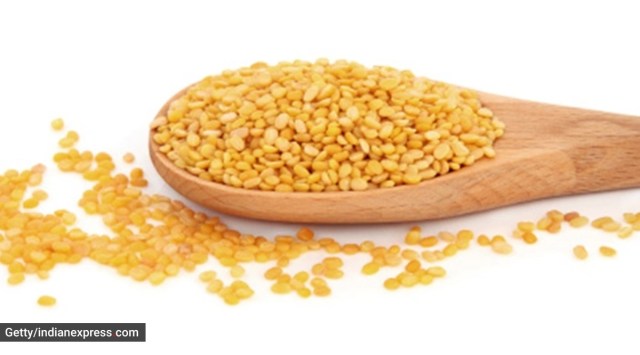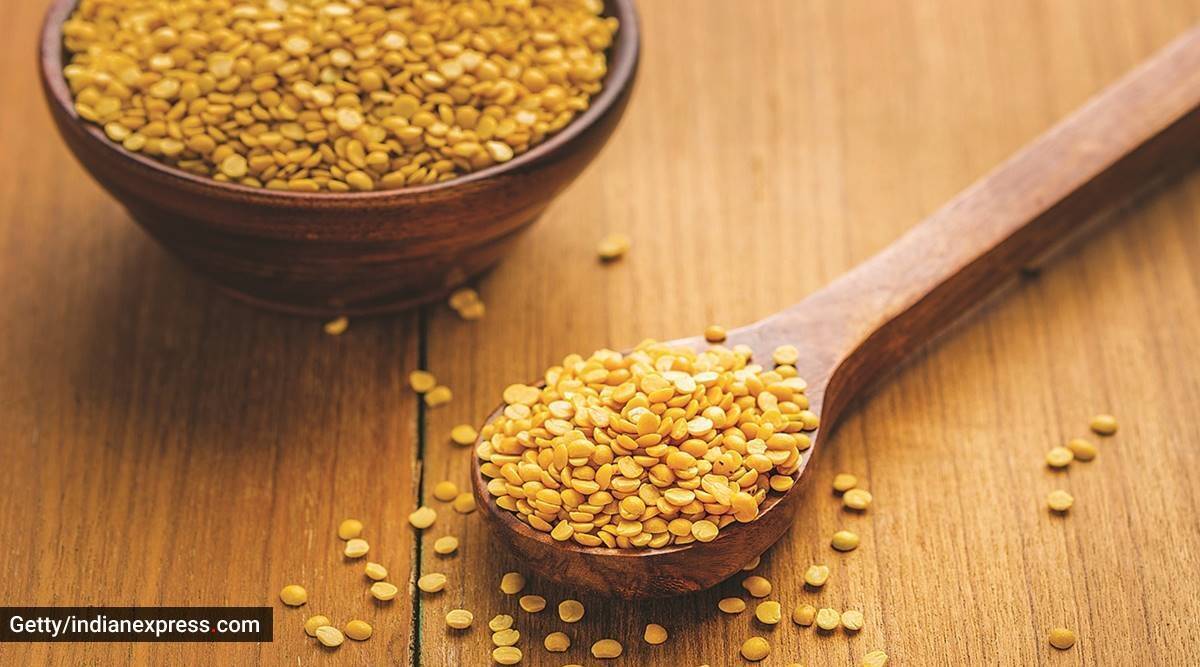📣 For more lifestyle news, click here to join our WhatsApp Channel and also follow us on Instagram
Nutrition alert: Here’s what a 100-gram serving of moong dal contains
Let us take a look at the health benefits of moong dal. Can people with diabetes benefit from it? What are some misconceptions about it?
 Learn about moong dal. (Source: Getty Images/Thinkstock)
Learn about moong dal. (Source: Getty Images/Thinkstock)Yellow dal and rice – these foods are often associated with home and the idea of comfort. (Understand why we crave certain ‘comfort foods’) There is also the added benefit of this meal being a healthier choice than the usual burgers and pizzas.
Yellow dal or moong dal is highly nutritious and the most widely used lentil in Indian kitchens, according to Dr Ushakiran Sisodia, registered dietician and clinical nutritionist, Nanavati Max Super Speciality Hospital, Mumbai.
Let’s take a look at the health benefits of this pulse.
Nutritional profile of moong dal
Every 100g of cooked moong dal approximately contains the following nutrients, as per Sisodia.
Calories: 105 kcal
Protein: 7.1g
Fat: 0.4g
Carbohydrates: 19.1g
Dietary fibre: 7.6g
Iron: 1.4mg
Magnesium: 48mg
Potassium: 292mg
Vitamin B6: 10% of the Daily Value
Folate: 24% of the Daily Value
 Due to its low glycaemic index, moong dal slowly releases sugar into the bloodstream, Sisodia explained, so it is a safe choice for people with diabetes. (Source: Getty Images/Thinkstock)
Due to its low glycaemic index, moong dal slowly releases sugar into the bloodstream, Sisodia explained, so it is a safe choice for people with diabetes. (Source: Getty Images/Thinkstock)
Health benefits of moong dal
Sisodia explained that moong dal is an excellent source of plant-based protein and dietary fibre, aiding digestion and preventing constipation. “Its vitamin and mineral content, such as folate, magnesium and vitamin B6, makes it nutritionally dense,” she added. Furthermore, its low-fat content promotes heart health.
Is it beneficial for people with diabetes?
Due to its low glycaemic index, moong dal slowly releases sugar into the bloodstream, Sisodia explained, so it is a safe choice for people with diabetes. However, as with any food, it is recommended to speak with your diabetologist or nutritionist before making any additions to your diet.
Can pregnant women eat it safely?
Pregnant women can benefit greatly from moong dal, according to Sisodia. “Its folate content aids in preventing certain defects in the foetus; iron assists in avoiding anaemia; and protein supports foetal growth. However, it is always recommended to consult with a gynaecologist or nutritionist for specific dietary advice during pregnancy,” she said.
 A common myth about moong dal is that it causes weight gain due to its protein content. (Source: Unsplash)
A common myth about moong dal is that it causes weight gain due to its protein content. (Source: Unsplash)
Things to keep in mind
While moong dal is nutritious, activities such as soaking, sprouting, or fermenting can reduce these levels, Sisodia emphasised. Some individuals may have allergies to legumes, including moong dal, manifesting as rashes, breathing difficulties, or gastrointestinal issues.
Myths and facts
A common myth about moong dal is that it causes weight gain due to its protein content. However, Sisodia clarified that in reality moong dal supports weight management and muscle building.
Another misconception is that it creates ‘heat’ in the body. This is a traditional belief and lacks scientific backing. Moong dal, especially when sprouted, is considered to be cooling and easy to digest, explained Sisodia.
📣 For more lifestyle news, follow us on Instagram | Twitter | Facebook and don’t miss out on the latest updates!
📣 For more lifestyle news, click here to join our WhatsApp Channel and also follow us on Instagram



- 01
- 02
- 03
- 04
- 05
























